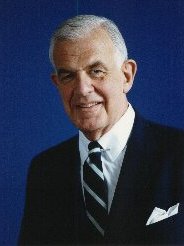by Paul Jacob

We never met. Even if we had met, we wouldn’t have been friends: we wouldn’t have traded holiday cards, certainly wouldn’t have shared a drink or played tennis or joked together at a party. (I wonder if he played tennis.)
Former Speaker of the House Thomas S. Foley (D‑Wash.) passed away on Friday at age 84. We were political antagonists, twenty years ago, when the issue of term limits placed us at loggerheads.

It wasn’t personal. Foley was just another congressperson to me, though his 30 years in Congress and his leadership position obviously made him more answerable for the then-high levels of congressional arrogance and dysfunction — which seem so much less toxic now, in retrospect, because of the passage of time and the fresh memories of current congressional malevolence.
In those days, I served as executive director of U.S. Term Limits, and was campaigning to place limits on the number of terms any person could spend in Congress. The idea was to disable politicians from holding power for decades without ever having to return home to live under the laws they had passed.
Back then Congress exempted itself from many of the laws it enacted. That practice has noticeably changed, as sometimes now the president must also be called in to exempt Congress from the laws it passes, as with Obamacare.
In 1992, working with citizen leaders in 14 states, we petitioned to place term limits initiatives on the ballot — the most states to ever vote on a single issue in the same election cycle. Voters in all 14 states approved term limits, including in Speaker Foley’s home state of Washington.
Washington’s Initiative 573 lost narrowly in Foley’s congressional district, but won statewide. The voters had spoken and, though the Speaker was returned to office for the next term, he was also now limited to no more than three additional terms, six years.
So, Speaker of the House Tom Foley sued in federal court to overturn the vote cast by the people of his state imposing term limits on him. It was neither the first nor the last time a politician sued his voters, but few campaign managers recommend it. Being a plaintiff in the lawsuit against term limits proved Speaker Foley’s undoing, a misstep from which he could not recover.
Foley and his spokespeople often cited the fact that folks in his district had sided against the term limits measure. True, but even among that very slim majority, his lawsuit to overturn the people’s vote felt like a slap in the face and was seen as an unmistakable sign Mr. Foley had “gone Washington.”
The other Washington.
As the 1994 election approached, congressional Republicans were embracing term limits in their Contract with America, and so was a young lawyer from Spokane named George Nethercutt, who was challenging Speaker Foley. Nethercutt not only claimed to favor term limits, he pledged to serve just three terms, as Washingtonians had voted, and he promised never to sue his constituents as Foley was doing. The term limits movement spent more than $300,000 on TV and radio spots and mailings reminding eastern Washington voters of all that Foley had done to deny their vote and block his own term limits.
On that election night some nineteen years ago, Tom Foley’s opposition to term limits made him the first Speaker of the House since the Civil War to be defeated for re-election. Historically, sitting speakers have been rarely defeated. In modern times, with the power of incumbency, it had never happened.
Galusha Aaron Grow, a Radical Republican from Pennsylvania, was the last speaker so turned out back in 1862, after a dozen years in Congress … but just a single term as House speaker. Ironically, Grow had replaced William Pennington, a New Jersey Republican who was defeated for re-election in 1860 after serving his only congressional term — the last portion of which he was installed as a compromise speaker.
Not much has been made of George Nethercutt’s amazing victory in 1994, because Nethercutt broke his word, refusing to step down from office after three terms.
Much is made of Foley’s historic defeat, however. In recognizing the passing of the former Speaker, Reuters reported that, “a conservative mood shift made him one of the few speakers ever defeated for re-election.” Time noted that, “Foley wasn’t the victim of scandal or charges of gross incompetence.”
Well, yes and no. Not “scandal” in a criminal way — or the X‑rated sense that politicians are so fond of providing to a mass audience these days. But for the voters of eastern Washington, suing to overturn their vote for term limits was politically scandalous, indeed. (Personally, I like their standards.) As the Seattle Times explained in remembering the man, “Few things unleashed the ire of Mr. Foley’s constituents as much as his dogged campaign against term limits.”
Though he was wrong about term limits and I was right, let me say after 20 more years of experience that I like Mr. Foley’s style. He seemed a happy warrior, never inspiring personal animosity. Hey, in politics, that’s saying something.
Memories of Speaker Foley spark in me a remembrance of what the people of eastern Washington did at the polls some twenty years ago. Those voters certainly did not want to let a nice man like Tom Foley go. But neither could they countenance his lawsuit. They were not swayed in the least by the lavish gifts a Speaker of the House could bestow on their area, and instead, they voted, heroically, to fix the broken Congress.
May Speaker Foley rest in peace. And may none of the rest of us rest until we again have a Congress that truly represents the American people. [references]
October 20, 2013
This column first appeared at Townhall.com.
